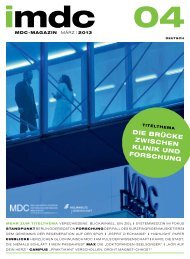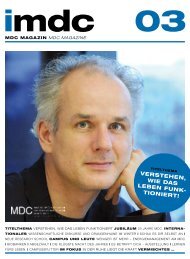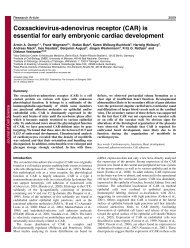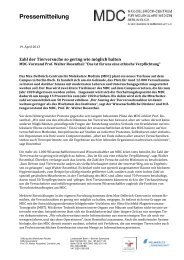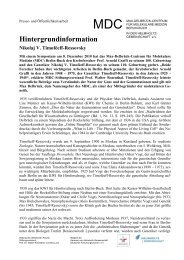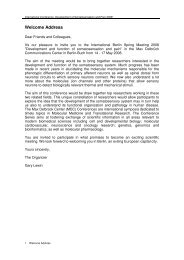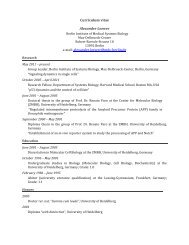of the Max - MDC
of the Max - MDC
of the Max - MDC
Create successful ePaper yourself
Turn your PDF publications into a flip-book with our unique Google optimized e-Paper software.
The Clinical Research Center (CRC)<br />
The best model for human disease remains man. An array <strong>of</strong> new biochemical,<br />
pathophysiological, and genetic concepts are being developed<br />
that require careful testing in human subjects and in patients<br />
with underlying disease. Proband or patient-oriented research can be<br />
ei<strong>the</strong>r basic or applied. The former tests hypo<strong>the</strong>ses regarding disease<br />
mechanisms; <strong>the</strong> latter tests <strong>the</strong>rapies or new diagnostic principles.<br />
Both are important but play different roles. We have founded a<br />
CRC within <strong>the</strong> ECRC that is not oriented towards single diseases and<br />
that serves all clinical departments at <strong>the</strong> <strong>MDC</strong> and elsewhere within<br />
<strong>the</strong> Charité system. The CRC will provide <strong>the</strong> possibility to conduct<br />
outpatient research, and, on a smaller scale, also inpatient research.<br />
The outpatient facility should include a research clinic and procedure<br />
rooms. The research clinic will include a nurse’s station, a secretary,<br />
examination rooms, outpatient dietary facility, genetic field working<br />
units, and space for medical records. The procedure rooms will accommodate<br />
diagnostic technologies, such as cardiopulmonary function<br />
testing, ultrasound (cardiac, abdominal, vascular), endoscopy, noninvasive<br />
electrophysiological testing, metabolic chamber, microneurography,<br />
microdialysis, and invasive hemodynamic testing. The<br />
inpatient research can be organized in so-called ‘scatter beds’ in <strong>the</strong><br />
hospital. In that way, CRC responsibility can extend to o<strong>the</strong>r departments<br />
or specialty units. To help identify genetic causes <strong>of</strong> disease,<br />
<strong>the</strong> CRC must also provide a branch for population genetics, genetic<br />
epidemiology, biostatistics, and bioinformatics. Experts will have to<br />
be recruited who are trained in analyses <strong>of</strong> gene expression and protein<br />
pr<strong>of</strong>iling data. The CRC <strong>of</strong>fers <strong>the</strong> possibility <strong>of</strong> patient recruitment<br />
extending beyond Buch or even beyond Berlin. Patients could<br />
be recruited from o<strong>the</strong>r Charité campuses in Berlin (3,500 hospital<br />
beds) and from <strong>the</strong> HELIOS clinics in Germany and Austria (500,000<br />
hospital admissions/year).<br />
Support for Infrastructure for Clinical Research in Buch<br />
The Department <strong>of</strong> Surgical Oncology focuses its research on solid<br />
tumors <strong>of</strong> <strong>the</strong> gastrointestinal tract and, more recently, also on breast<br />
cancer. The CRC can provide patient facilities that allow <strong>the</strong> use <strong>of</strong> <strong>the</strong><br />
novel imaging techniques, like MRI, PET scanning, light mammography,<br />
or <strong>the</strong> testing <strong>of</strong> innovative <strong>the</strong>rapies. The Department <strong>of</strong><br />
Hematology/Oncology focuses on <strong>the</strong> analysis <strong>of</strong> multiple myeloma<br />
and leukemias. Isolating and identifying tumor cells will be a function<br />
<strong>of</strong> <strong>the</strong> CRC. The Cardiology Department is studying <strong>the</strong> genetics <strong>of</strong><br />
heart muscle disease. Imaging plays an important role in <strong>the</strong>ir diagnosis,<br />
and patients who require such evaluations outside <strong>of</strong> <strong>the</strong>ir routine<br />
care can be admitted to <strong>the</strong> CRC. The Nephrologists and Clinical<br />
Pharmacologists focus on patients who are being evaluated for obesity,<br />
diabetes, autonomic dysfunction, and patients with systemic vasculitis.<br />
The Neurology department is primarily interested in patients<br />
Das klinische Forschungszentrum (Clinical Research<br />
Center)<br />
Der Mensch bleibt das beste Modell für menschliche Krankheiten. Eine<br />
Vielzahl neuer biochemischer, pathophysiologischer und genetischer<br />
Konzepte sind in der Entwicklung, die eine sorgfältige Überprüfung an<br />
Probanden und Patienten mit den betreffenden Krankheiten erfordern.<br />
Probanden- oder patientenorientierte Forschung kann entweder Grundlagenforschung<br />
oder angewandte Forschung sein. Erstere prüft Hypo<strong>the</strong>sen<br />
in Bezug auf Krankheitsmechanismen, letztere prüft Therapien<br />
oder neue diagnostische Ansätze. Beide sind wichtig, spielen aber<br />
unterschiedliche Rollen. Das <strong>MDC</strong> und die Charité haben ein CRC innerhalb<br />
des ECRC gegründet. Es steht allen klinischen Forschergruppen am<br />
<strong>MDC</strong> und allen insgesamt vier Standorten der Charité zur Verfügung. Mit<br />
dem CRC wird es möglich sein, ambulante Forschung sowie im kleineren<br />
Rahmen auch stationäre Forschung zu betreiben. Das CRC in Berlin-<br />
Buch soll den CRCs in den USA entsprechen. Dort spielen die CRCs auch<br />
eine wichtige Rolle in der hochwertigen medizinischen Ausbildung.<br />
Unser leitender CRC-Arzt und seine Mitarbeiter haben Facharztqualifikationen<br />
für Innere Medizin und Klinische Pharmakologie. Das CRC befindet<br />
sich zurzeit in der Robert-Rössle-Klinik auf dem Campus Berlin-<br />
Buch. Das Gebäude liegt in der Nähe des neuen HELIOS-Klinikgebäudes.<br />
Ein neues Charité-Gebäude unmittelbar neben der Klinik für das CRC und<br />
spezialisierte Hochschulambulanzen der fünf klinischen Abteilungen ist<br />
in Planung.<br />
Die Forschungsambulanz wird über Untersuchungs- und Behandlungsräume,<br />
eine Schwesternstation, Büros, eine Verpflegungseinrichtung<br />
für ambulante Patienten sowie Genlabore und ein medizinisches Archiv<br />
verfügen. Die technische Ausstattung der Untersuchungs- und Behandlungsräume<br />
ermöglicht die Durchführung diverser diagnostischer Tests<br />
und Untersuchungen wie beispielsweise kardiopulmonale Funktionstests,<br />
Ultraschall (kardial, abdominal, vaskulär), Endoskopie, nichtinvasive<br />
elektrophysiologische Tests, St<strong>of</strong>fwechselkammer, Mikroneurographie,<br />
Mikrodialyse und invasive hämodynamische Tests. Die stationäre<br />
Forschung kann in sogenannten „Belegbetten” in der Klinik organisiert<br />
werden. So kann das CRC patientenorientierte Forschungsprojekte<br />
bei Bedarf auch außerhalb der eigenen Räumlichkeiten in Stationen<br />
oder Spezialabteilungen unterstützen. Für die Ermittlung genetischer<br />
Krankheitsursachen benötigt das CRC zudem auch eine Abteilung für<br />
Populationsgenetik, genetische Epidemiologie, Biostatistik und Bioinformatik.<br />
Weiter benötigt das CRC Experten für Genexpressionsanalysen<br />
und Protein-Pr<strong>of</strong>iling. Im CRC können Patienten aus einem größeren<br />
Einzugsgebiet, das über Buch bzw. Berlin hinausreicht, gewonnen werden.<br />
Patienten könnten auch von den anderen Campus-Standorten der<br />
Charité (3500 Klinikbetten) oder von den HELIOS-Kliniken in Deutschland<br />
und Österreich (500.000 Klinikeinweisungen/Jahr) an das CRC<br />
überwiesen werden.<br />
Overview 207



